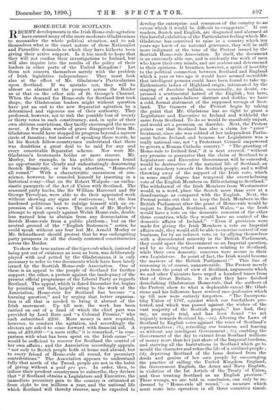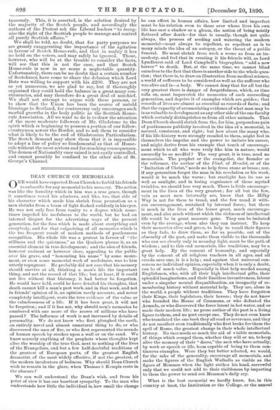HOME-RULE FOR SCOTLAND. R ECENT developments in the Irish Home-rule agitation
have caused many of the more moderate Gladstonians to reconsider the whole political situation, and to ask themselves what is the exact nature of those Nationalist and Parnellite demands to which they have hitherto been giving their active support. Is it too much to hope that they will not confine their investigations to Ireland, but will also inquire into the results of the policy of their leaders in other parts of the United Kingdom ? Let them not concern themselves merely with the problem of Irish legislative independence. They must look also at the effect of Mr. Gladstone's Particularism upon Scotland. If we mistake not, they will be almost as alarmed at the prospect across the Border as at that on the other side of St. George's Channel. When the demand for Home-rule for Scotland first took shape, the Gladstonian leaders might without question have put an end to the new Separatist agitation by a determined and vigorous use of their authority. They preferred, however, not to risk the possible loss of twenty or thirty votes in each constituency, and, in spite of their own obvious convictions, they tacitly encouraged the move- ment. A few plain words of grave disapproval from Mr. Gladstone would have stopped its progress beyond a narrow circle of fanatics ; but instead of speaking those words, he let his Scotch fellow-countrymen understand that there was doubtless a great deal to be said for any and every conceivable Separatist scheme. Nor were Mr. Gladstone's lieutenants bolder or more sincere. Mr. Morley, for example, in his public utterances found no opportunity for clearly and unhesitatingly denouncing Scotch Home-rule, or its twin abortion, " Home-rule all round." With a characteristic uneasiness of con- science, however, he consoled himself by inserting in a historical essay—that on Sir Robert Walpole—an enthu- siastic panegyric of the Act of Union with Scotland. The seasoned party hacks, like Sir William Harcourt and Sir George Trevelyan, were able to do their appointed work without showing any signs of restiveness ; but the less hardened politician had to indulge himself with an ex- pression of his own views. The result of Mr. Morley's attempt to speak openly against Welsh Home-rule, doubt- less warned him to abstain from any denunciation of Scotch Home-rule from a public platform ; but on the neutral ground of the " English Statesmen " series, he could speak without any fear lest Mr. Arnold Morley or Mr. Schnadhorst should protest that he was endangering party prospects in all the closely contested constituencies across the Border.
To show the true nature of the tiger-cub which, instead of being put out of existence as soon as born, was deliberately played with and petted by the Gladstonians, it is only necessary to refer to two documents which have been lately issued by the Scottish Home-rule Association. One of these is an appeal to the people of Scotland for further support; the other, a protest against the inadequacy of the present official programme of the Liberal Party as regards Scotland. The appeal, which is dated December 1st, begins by pointing out that, largely owing to the work of the Association, Home-rule for Scotland has become " a burning question," and by urging that better organisa- tion is all that is needed to bring it abreast of the Irish movement. Up till now, the work has been carried on out of a fund of which the chief part was provided by Lord Bute and " a Colonial Premier," who each subscribed £200. More money is now required, however, to conduct the agitation, and accordingly the electors are asked to come forward with financial aid. A sum of £10,000—" a mere trifle," it is remarked, " in com- parison with what has been spent on the Irish cause "- would be sufficient to recover for Scotland the control of her own affairs ; and the Association accordingly appeals, " not only to Scotch people both at home and abroad, but to every friend of Home-rule all round, for pecuniary contributions." The Association appears to understand fully that north of the Tweed, people are not in the habit of giving without a quid pro quo. In order, then, to induce their prudent countrymen to subscribe, they declare that " if Scotland obtains a Legislature and Executive, the immediate pecuniary gain to the country is estimated at from eight to ten millions a year, and the national life which Scotland will thereby recover, may be expected to develop the enterprise and resources of the country to an extent which it would be difficult to exaggerate." If our readers, Scotch and English, are disgusted and alarmed at this hateful exhibition of the Particularist feeling which Mr. Gladstone has contrived to raise in a country which ten years ago knew of no national grievance, they will be still more indignant at the tone of the Protest issued by the- Scottish Home-rule Association. In itself, the document is an extremely able one, and is evidently the work of men who know their own minds, and are zealous and determined in their opinions. It breathes, however, a spirit of hostility to the political connection between Scotland and England which a year or two ago it would have seemed incredible that intelligent persons could have been found to take up.. Enthusiastic ladies of Highland origin, intoxicated by the singing of Jacobite ballads, occasionally, no doubt, ex- pressed a sentimental hatred of the English ; but here,. instead of a make-believe distrust and dislike, we have a cold, formal statement of the supposed wrongs of Scot-- land. The framers of the Protest begin by taking the point that Mr. Gladstone has no right to grant a, Legislature and Executive to Ireland and withhold the same from Scotland. To do so would be manifestly unjust, and would set a premium on disorder. Next, the Protest points out that Scotland has also a claim for " prior treatment, since she was robbed of her independent Parlia- ment before Ireland, and because her Legislature was a really national one, not " a Protestant Council empowered to govern a Roman Catholic country." " The granting of Home-rule to Ireland first," it is next averred, " without any promise or guarantee that the claim of Scotland to a Legislature and Executive Government will be conceded,. would be destructive of the national life of Scotland, an act of treachery towards the Scottish people, and a wilful throwing away of the support of the Irish vote, which in some small degree has tempered the overwhelming vote of the English Members on Bills relating to Scotland." The withdrawal of the Irish Members from Westminster would, in a word, place the Scotch more than ever at a disadvantage as compared with the English. Next, the Protest points out that to keep the Irish Members in the- British Parliament after the grant of Home-rule would be unjust to England, Scotland, and Wales, " as the Irish would have a vote on the domestic concerns of the other three countries, while they would have no control of the domestic affairs of Ireland." " Even if provision were made for giving the Irish Members a vote on Imperial affairs only, they would still be able to exercise control of our business, for by an indirect vote, or by allying themselves with a discontented minority in the British Parliament, they could upset the Government on an Imperial question, and by so doing retard measures relating to Scotland, while their own domestic concerns were secure in their own Legislature. In point of fact, the Irish would become the masters of the British Parliament!" This line of reasoning is, of course, unanswerable. The Protest merely- puts from the point of view of Scotland, arguments which we and other Unionists have urged a hundred times from that of Great Britain. It is after they have finished demolishing Gladstonian Home-rule, that the authors of the Protest show to what a deplorable extent Mr. Glad- stone and his followers have revived race-jealousies which up till now were entirely forgotten. " The Incorpora- ting Union of 1707, against which our forefathers pro- tested, and which was passed against the wishes of the- vast majority of the Scottish people," has had, they say, an ample trial, and has been found "to act unjustly towards Scotland by,—(a), Altering the Laws of Scotland by English votes against the voice of Scotland's representatives ; (b), retarding our business, and leaving us without any intelligent Government ; (c), enabling the Government of the day to extract from Scotland millions of money more than her just share of the Imperial burdens, and starving all the Institutions in Scotland which go to mould the character and refine the life of a civilised people ; (d), depriving Scotland of the fame derived from the deeds and genius of her own people by encouraging- the practice of calling the United Kingdom England, the Government English, the Army and Navy English, in violation of the 1st Article of the Treaty of Union,. and thus treating Scotland as an English province." These wrongs, we are told in conclusion, can only be re- dressed by " Home-rule all round,"—a measure which must come into operation in all three countries simul- taneously. This, it is asserted, is the solution desired by the majority of the Scotch people, and accordingly the authors of the Protest ask the Liberal leaders " to recog- nise the right of the Scottish people to manage and control all purely Scottish affairs."
We shall be told, no doubt, that for party purposes we are grossly exaggerating the importance of the agitation in favour of Scotch Home-rule, and that in reality it has no hold on the voters, and may safely be ignored. Those, however, who will be at the trouble to consider the facts, will see that this is not the case, and that Scotch Home-rule is now in no sense a neglectable quantity. Unfortunately, there can be no doubt that a certain number of Scotchmen have come to share the delusion which Lord Bute was willing to support with his £200. They are not as yet numerous, we are glad to say, but if thoroughly -organised they could hold the balance in a great many con- stituencies, and may therefore do a great deal of mischief. We shall not attempt to argue with these persons, or to show that the Union has been the source of untold blessings to Scotland, for controversy only encourages such morbid growths in the body politic as the Scottish Home- rule Association. All we want to do is to draw the attention of the more moderate followers of Mr. Gladstone to the spirit which is beginning to possess a portion of our fellow- countrymen across the Border, and to ask them to consider what is likely to be the end of Gladstonian Particularism. The Scotch demand may show them that it is impossible to adopt a line of policy so fundamental as that of Home- rule without the most serious and far-reaching consequences. The demon of Nationality once raised is not easily controlled, and cannot possibly be confined to the other side of St. George's Channel.











































 Previous page
Previous page